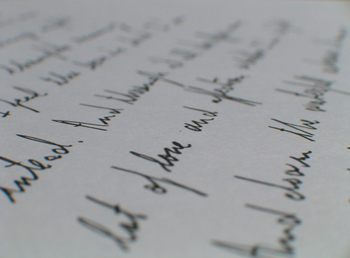 Yesterday on Better Writing Habits, Suzannah Windsor Freeman posted Forget These 7 Things for First Draft Freedom. Among other things, the list included grammar, spelling, transitions and word choice. The task was: When you start writing the first draft of your next work-in-progress, challenge yourself to just write, and leave these details for future drafts.
Yesterday on Better Writing Habits, Suzannah Windsor Freeman posted Forget These 7 Things for First Draft Freedom. Among other things, the list included grammar, spelling, transitions and word choice. The task was: When you start writing the first draft of your next work-in-progress, challenge yourself to just write, and leave these details for future drafts.
I have a love/hate relationship with the first draft, which I am on the front lines of with my current novel. On one hand, being forced to stand face-to-face with my own shortcomings is nothing less than depressing; on the other hand, the first draft is where all the magic happens. It’s exciting to watch the story unfold before me and take turns I never expected and I love getting to know the characters for the first time. Nothing kills that magic faster, though, than getting caught up in the mechanics. That’s why I love Suzannah’s advice. When writing my first novel, before I trusted myself, it was too easy to get caught up in the little details, but this time I do trust myself so it’s easier to let go and enjoy the process. Suzannah talks about what to forget so here are some things to remember:
- All first drafts suck. Yep, even that published one sitting on your nightstand. The author of that novel once cringed at his or her own words. Every writer starts exactly where you are now. Instead of getting hung up on it, enjoy it.
- Focus on the feeling. Get out of your head and into your heart. Don’t worry about what it sounds like or how cleanly it reads–connect with the scene and feel the emotions of your characters. It’s easier to describe the feeling of a pounding heart when you’re experiencing it.
- Don’t be afraid to embrace the unexpected. Sometimes your story might go in a direction you didn’t plan. That’s your muse talking. That’s your writer fuel. Listen to it.
- Your characters are people too. Make friends with them so they become fully formed people in your mind. Take them with you wherever you go and let them react to everyday situations. It will help you get to know them better.
- The end will come. As long as you keep writing one word after another, for better or for worse, the end will come.
And one more general rule: always, always carry a notebook with you. Inspiration will you strike you at the most unexpected times.
The first draft is a gift to writers if we can learn to accept it. Only through facing our shortcomings can we ever overcome them and the first draft is your crash course. That’s the magic of it.
I’m conflicted about this. On one hand, of course I don’t want to dwell on a first draft forever and be stuck at that point. On the other, I want to devote enough time so that I don’t have to come back and re-write the entire thing. I’ve had to do that after writing (faster than usual). It’s a difficult balance for me.
I used to feel the same way about editing. Who wants to spend all that time writing it just to go back and tear it apart later? But the truth is, it’s never perfect on the first run through. Revisions are absolutely necessary. So I figure, you might as well enjoy the first draft.
Just keep writing and you’ll find your balance. There is a way that works exactly right for you and no one else.
Hmm … this may be part of why I always (or almost always, anyway) get stuck in the middle of my first draft. I see the not-quite-what-I-expected ending coming and stop writing because I don’t want to go there.
You might surprise yourself and like the unexpected ending even better. After all, you know the characters better halfway through than you did when you first started.
I’m currently in the painful process of the first draft. I really enjoyed this post. Perhaps it’s time to change my attitude and start to appreciate the process of the first draft.
I’ll be blogging about and linking to this post. Thank you Jamie!
Thank you, Corey! I really do think it’s all in how you look at it. Even during the hardest parts, just say, “Hey, I’m writing!” The worst day of writing is better than the best day of not writing, right?
True!